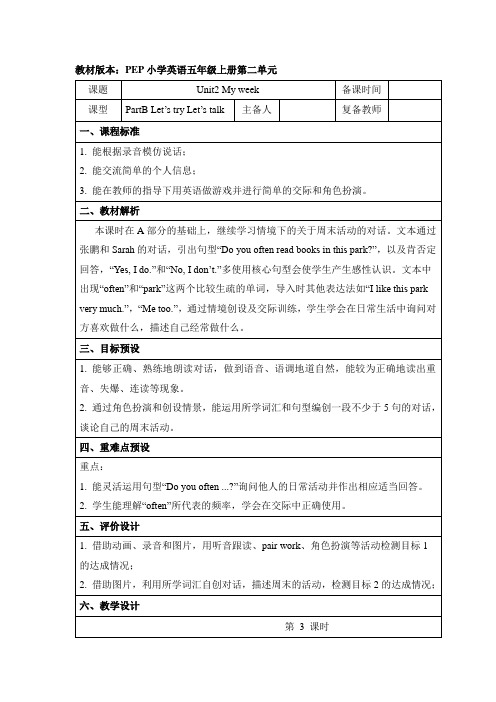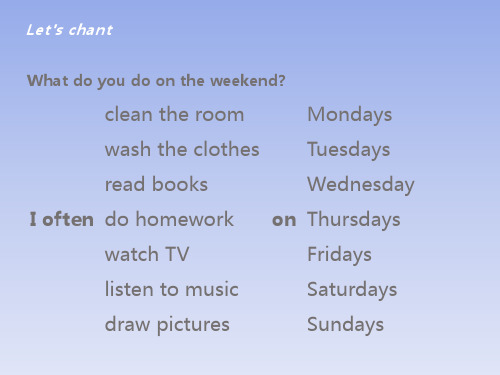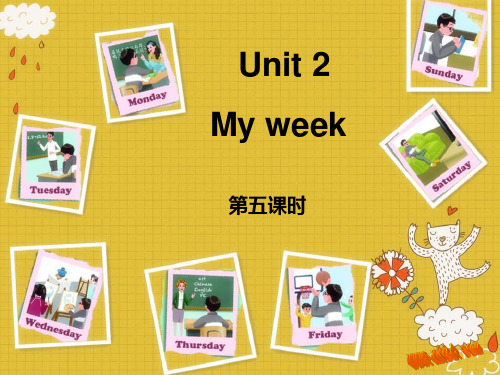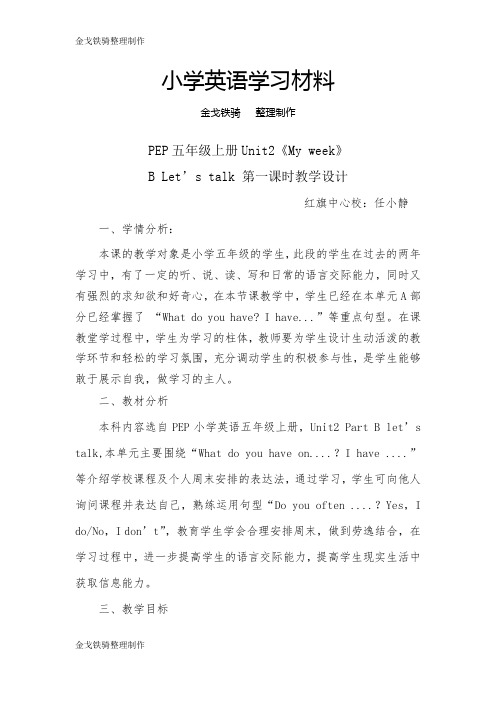五上U2 Part B Let's talk
- 格式:pptx
- 大小:10.89 MB
- 文档页数:14




小学英语学习材料金戈铁骑整理制作PEP五年级上册Unit2《My week》B Let’s talk 第一课时教学设计红旗中心校:任小静一、学情分析:本课的教学对象是小学五年级的学生,此段的学生在过去的两年学习中,有了一定的听、说、读、写和日常的语言交际能力,同时又有强烈的求知欲和好奇心,在本节课教学中,学生已经在本单元A部分已经掌握了“What do you have? I have...”等重点句型。
在课教堂学过程中,学生为学习的柱体,教师要为学生设计生动活泼的教学环节和轻松的学习氛围,充分调动学生的积极参与性,是学生能够敢于展示自我,做学习的主人。
二、教材分析本科内容选自PEP小学英语五年级上册,Unit2 Part B let’s talk,本单元主要围绕“What do you have on....?I have ....”等介绍学校课程及个人周末安排的表达法,通过学习,学生可向他人询问课程并表达自己,熟练运用句型“Do you often ....?Yes,I do/No,I don’t”,教育学生学会合理安排周末,做到劳逸结合,在学习过程中,进一步提高学生的语言交际能力,提高学生现实生活中获取信息能力。
三、教学目标教学内容1、教学内容:Part B Let’s try and Let’s talk2、能够正确听、说、读、写动词词组:play ping-pong ,play football do homework,listen to music。
3、能够正确听、说、朗读:“Do you often play ping-pong on theWeekend?”等句型询问别人经常做某事的句型。
4、在对话交流中使学生养成用英语交流的习惯,培养学生良好的语音、语调和语感。
四、教学重点难点分析重点:能够熟练运用本课重点句型“Do you often ...?”来询问他人经常做的事。
难点:1、句型:“Do you often ...?”的肯定和否定回答。


Unit 2 My week
Part B Let's talk
一、教学目标
1.能够听、说、认读日常活动相关词汇:often, park, listen to music
2.能够运用句型“Do you often ...? Yes, I do./No, I dorft.”询问对方是否经常做某事并作出相应的回答。
3.能够按照正确的语音、语调及意群朗读对话,并能就日常活动进行角色扮演。
4.培养学生学会合理并充分利用时间,丰富自己的课余生活。
二、教学重难点
重点:
1 .能够听、说、认读日常活动相关词汇:often, park, listen to music
2.能够运用句型“Do you often ...? Yes, I do./No, I don,t.?,询问对方是否经常做某事并作出相应的回答。
难点:
能够运用句型“Do you often ...? Yes, I do./No, I dont”询问对方是否经常做某事并作出相应的回答。
三、教学准备
教学课件,录音,课文视频
四、教学过程
五、板书设计
Unit 2 My week
Part B Lefs try&Lefs talk
Do you often ... on the weekend?
Yes, I do./No, I don't.。
Unit2 My week part B Let’s talk (教案)一、教学目标1.能够听懂并阅读有关活动安排的对话。
2.能够流利地运用日常用语询问和回答关于活动安排的问题。
3.能够掌握一些关于时间的基本概念和表达方式。
二、教学内容1.对话:Activity Plan2.词汇:play soccer, do homework, watch TV, go swimming3.时间表达法:介词at, on, in的基本概念和运用三、教学重点和难点1.重点:能够听懂并学会运用对话中的词汇和运用介词at, on, in表达时间。
2.难点:运用所学内容回答对话中的问题。
四、教学过程1. 复习学生通过以前所学知识进行自我复习。
2. 导入教师出示一张日程表,让学生看看自己最近一个星期的活动安排并进行口语交流,引入即将学习的对话。
3. 学习对话1.通过分角色读对话进行初步理解。
2.教师将对话分段进行讲解,阐明每一句话的意思。
3.教师再播放语音让学生跟读。
4.学生再分组进行对话模仿演练。
4. 学习新单词学生通过看单词卡片进行学习和记忆。
5. 时间表达法的学习1.教师通过英文日历的展示,让学生熟悉月份的表达方式。
2.通过锻炼的话题练习介词at, on, in的运用。
6. 巩固练习1.教师出示多个关于时间的问题,让学生根据自己的安排回答。
2.学生自己编一则类似的对话,进行模拟练习。
7. 作业布置1.听读对话,熟悉内容并准备进行角色扮演练习。
2.复习已学的单词。
五、教学总结1.本堂课通过有趣的对话和词汇的学习,让学生更加清晰地了解日常活动的安排和时间的表达方式。
2.教师应积极引导学生,多利用所学知识进行交流和交往。
Zhisheng Primary School(智升小学)——Yang Xiaohu(杨小虎) Teaching Plan of Unit 2 Part B Let’s talkin PEP Grade 5 top volumeand say these sentences: What do you do on Saturdays / Sundays? I often do homework, read books and watch TV. And put them into practice in the daily life.2.Ability aim: pupil be able to phase evaluating themselves on what learned in this unit.3.Emotion attitude and values: after learning, pupil should realize the importance of saving ontime. And make the most of the time to study in weekend. And also keep the time in balance.1.Key points: pupil be able to master the sentences structure: What do you do on Saturdays /Sundays? I often do homework, read books and watch TV. And use them in real scene.2.Difficulties: pupil be able to talk about the daily life by using the phrases and sentencestructures accurately.1.Prepare the media, some pictures about the pupils’ or their familiar teachers’ life, radio andtaper, VCD about the text, some chalk.2.Be sure that pupil have make preparations for the role play which is the homework last class.Guiding: “Today is Friday. It is a nice day, isn’t it? So what do you do on Friday?...” Try to make a short communication with pupil by using what learned last class like that and lead to ask the question: “ What do you do after school?” Lead them to say: “Do homework.” And then say: “So you all remember the homework that I asked you to make a role play about what you do on weekends. Any volunteers performance your role play?1.Warm-up(1). Ask some groups to show their role play by using the sentence structures—“what do youdo on weekends? I…”as much as possible. Warm up for pupil and attract pupil’sattention.(2). After the role play, encourage pupil to arrange what they like to do in weekends andshare what teacher do in weekends.(3). Communicate with pupil by using the key sentence structures. Ask them what they do indifferent days2.PreviewGuide pupil to use the new words and sentence structure learned last class to make a preparation for this class learning. Combine the topic in warm-up.3.Presentation(1). After the preview, show some pictures. (The pictures are about the person who we allknow such as the pupil’s Chinese teacher, math teacher, classmates and so on.) And ask pupils what does … do on XXday? And let them answer the question through the pictures.(2). Choose some of the pupil to ask what they do on weekends.(3). Teacher say, “ we have known so much what our classmates and teachers do on weekends.But do you know what Sarah and Chen do on weekend? So now let’s have a look what they do on weekends. Attention please!”On the basis of previous learning, pupil have enough ability to watch the VCD directly. Finally ask some question about the passage, for example”what does Chen do on Sundays”(4). According to the passage, let pupil make new sentence by replace some parts in the text.And practice making sentences as much as possible. Make pupil know more about the sentence structures and new words.(5). Listen to the tape and follow it. And then read the passage in roles. Practice reading it andask some ones to act it out.4.Consolidation and extensionTeacher say,”From ancient times until today, Diaoyu Island belongs to China. However, recently, Japan tries to seize it. As a student, what can we do? It seems that we have not enough power to do anything. But we can save on time and work harder and harder. We can against any challenges. So now open your work book and do exercise. “It is time to practice in writing. Let pupil do the exercise Part B let’s talk in workbook.Ⅴ.Homework design1.Copy new words and sentences, the requisition: a word copy tow lines; a sentence copy twice.2.Try to repeat what to learn.3.Make a preparation for next class: learn the songs and try to make the new lyrics by usingwhat to learn.Ⅵ.Blackboard writing designUnit 2 My Days of the WeekB Let’s talkWhat do you do on Saturdays / Sundays?I often do homework, read books and watch TV.Ⅶ.Introspection after class。